by Aisha Yesufu | Jul 7, 2016 | 2016, Africa, Africa and Middle East, Communication, Education, Family, Motherhood, Nigeria, Priorities, School, Study Abroad, Travel, World Motherhood
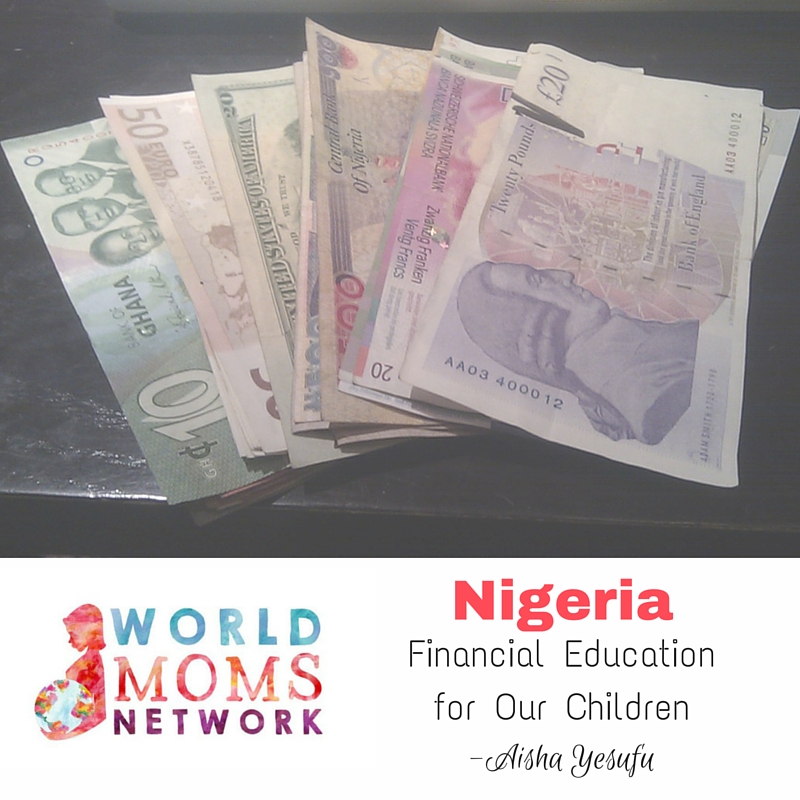
“Mummy, is it Buhari’s fault that the economy is bad?” My daughter asked me this when she returned from school one day. She’s referring to Muhammadu Buhari, the president of Nigeria. “You must always call him President Buhari,” I corrected my daughter. Then I realised this was another opportunity to educate my daughter about economy and finances.
I told her it’s not President Buhari’s fault that the economy is bad, rather it is the choices we made as a country. I told her Nigeria is like a big family. Imagine that the father had a big job and they paid him a very good salary. In this family, perhaps the mother chose not to work because the father’s salary was so good. The family lived well, and often traveled abroad for holidays, wearing designer clothes. Everything they did was expensive. They had huge parties all the time. Their children went to expensive schools and they go abroad for treatment even for a simple headache.
The father earned well, but did not save anything and sometimes borrowed even more money to maintain their extravagant lifestyle. At one time some family members started stealing the money for their own personal enjoyment. They stole this money right out of the family account.
One day the company the father worked for was no longer able pay the father his big salary, so they gave him a pay cut. Remember, the father did not save when he was earning a high income. Remember, the family led a very expensive lifestyle. Remember, the mother had no job, so she couldn’t support the family. So, there was problem.
Eventually, a new father was brought in and the salary was reduced further and further. The family still had no savings and money was still being stolen from the family account. The new father found it difficult to support that expensive lifestyle the family was accustomed to. In this case, there would be economic problems and it wouldn’t necessarily be the father’s fault. In the meantime, the father must still deal with the people who stole from the family account, and try to recover the money.
“Do you understand now?” I asked. “Yes, I do,” said my daughter, and she went away, satisfied.
Our children know something is wrong and we need to explain to them what is going on. At a school meeting recently, I overheard a parent wondering how can she tell her child they can’t afford to pay school fees? I told them as parents you need to financially educate your children. This is not done in school, so it’s the parent’s duty to ensure that children are aware of economy and finances.
My children are part of our family’s economic life. They know what’s going on in our businesses and their father’s job. They know when things are good that we are investing, and they know why we invest. They know where the money for their school fees is coming from and what sacrifices were made to make ends meet. When business is bad, they know. At one time I thought we couldn’t pay my daughter’s school fees and I told her she had to delay a week or more before starting school (we always pay school fees before resumption date. It’s my personal stand). Luckily we managed to pay on time, but she learned that it’s a possibility and understands life sometimes throws a spanner into the works.
When we joined my husband in Abuja in 2011, my children’s school fees were fifty times higher than what we were used to paying. I had to sit my children down to explain that we needed to make sacrifices for their education. One of the decisions we made as a family was to reduce travelling abroad for holidays. So we did, and my children understood why.
In December, my daughter went to Europe for her school’s annual ski trip. She noted that there were a lot fewer students on the trip than previous years. My daughter also went to Wales this month for the Duke of Edinburgh expedition. Similarly, not all the students participating in the Duke of Edinburgh programme went for the expedition. I had to explain to her there was economic downturn and it was not easy for all families to afford such trips. At the moment, we are seriously worried about paying for education because our currency was losing value. She gave me a worried look and said, “God willing, everything will be okay.” “Amen,” I replied.
My daughter left the house a better-informed child. I hope that when she becomes an adult, she will be better prepared for economic and financial challenges because she learned about it as a child. As parents, we cannot shield our children from the reality of life. Let them learn from us and be more financially savvy.
How do you ensure that your children get a good understanding of your family finances?
This is an original post written for World Moms Blog by Aisha Yesufu in Nigeria.
Photo credit: Bob Ryskamp / Flickr

by Ecoziva (Brazil) | Jul 1, 2016 | 2016, Brazil, Family, Identity, Kids, Life, Life Balance, Maternal Health, Motherhood, Parenting, SAHM, South America, Stay-At-Home Parent, The Americas, Womanhood, Work, Working Mother, World Motherhood, Younger Children
 Many women nowadays have to split their time between a full time job and their kids (and their husband, and taking care of their home, and and and…). Another group of women is able to work from home, at least part of the time, or to work some at home and some in the office. If you, like me, are in this second group, some days it might seem like there are two women chatting in your head, the Professional working mom and the Homemaker. For me, a typical work day outside of the home goes more or less like this…
Many women nowadays have to split their time between a full time job and their kids (and their husband, and taking care of their home, and and and…). Another group of women is able to work from home, at least part of the time, or to work some at home and some in the office. If you, like me, are in this second group, some days it might seem like there are two women chatting in your head, the Professional working mom and the Homemaker. For me, a typical work day outside of the home goes more or less like this…
Professional – Oh my gosh it is so great to be able to get some work done in peace! I love to work!
Homemaker – The kids are growing up so fast… soon they will be teens and won’t even want to look at you!
Professional – The kids need to see their mother working and doing something she likes.
Homemaker – Come on, don’t be cynical, you don’t even like your job that much! It’s just a way to escape the kids a bit!
Professional (ignoring the Homemaker) – If only I could work outside of home for more days I could get sooooo much done!! My career would skyrocket! Maybe I should put the three-year old in play school next semester. Imagine, working in peace five mornings a week!?
Homemaker – Oh yeah? And where would you find the extra money? What about the car pool? You can barely find rides for two to come home from school, three would be worse! And he is so little…
Professional – Oh no! I can’t believe it’s time to go home already!! I didn’t do ten percent of what I needed to!! Ahhhhh! Another sleepless night awaits me!! I am so tired! I need chocolate… Sob…
On other days, a typical day at home goes like this…
Homemaker (at the park) – Oh, look at them. They are so cute and cuddly. I love being a mom. I can’t believe the youngest is already three. I will miss having little kids around. Should I have another baby?
Professional – Are you out of your mind?????
Homemaker (ignoring the Professional working mom) – If only I could afford to stay at home all the time… And then, when they started to grow older, I could work in what I really like. I would also have time to take better care of the house and to exercise and get in shape again.
Professional – My job is stable. I can’t earn enough money to raise kids doing only what you like. That’s so naïve.
Homemaker – It’s so peaceful here with them. If only I could stay at home in peace and not need to hear you worry about work and deadlines and…
Professional – Oh no! That deadline! You need to drop them off at grandma’s now!!
Homemaker – You know they only stay at grandma’s once a week max. Otherwise they get stressed out. You can work tonight.
Professional – I need to sleep!! I already worked last night! You know I can’t work all night two days in a row! I am not twenty anymore!
Homemaker – On that we agree! We get so crabby when we don’t sleep enough. It’s not good for the kids. Maybe you should stop working nights and work only during the weekend when they can stay with their father.
Professional – No!!!!! I have so much to do!!!!! Weekends are not enough.
And so it goes….
And you… Do you work from home, from an office or both? How do you find balance? Please share your story below.
This is an original post to World Moms Blog by Ecoziva in Brazil. Photo credit to the author.
Eco, from the greek oikos means home; Ziva has many meanings and roots, including Hebrew (brilliance, light), Slovenian (goddess of life) and Sanskrit (blessing). In Brazil, where EcoZiva has lived for most of her life, giving birth is often termed “giving the light”; thus, she thought, a mother is “home to light” during the nine months of pregnancy, and so the penname EcoZiva came to be for World Moms Blog.
Born in the USA in a multi-ethnic extended family, EcoZiva is married and the mother of two boys (aged 12 and three) and a five-year-old girl and a three yearboy. She is trained as a biologist and presently an university researcher/professor, but also a volunteer at the local environmental movement.
More Posts
by Mannahattamamma (UAE) | Jun 30, 2016 | Africa and Middle East, Brothers, Competition, Cultural Differences, Expat Life, Global Citizenship, Living Abroad, Middle East, Older Children, School, Travel, UAE, World Motherhood
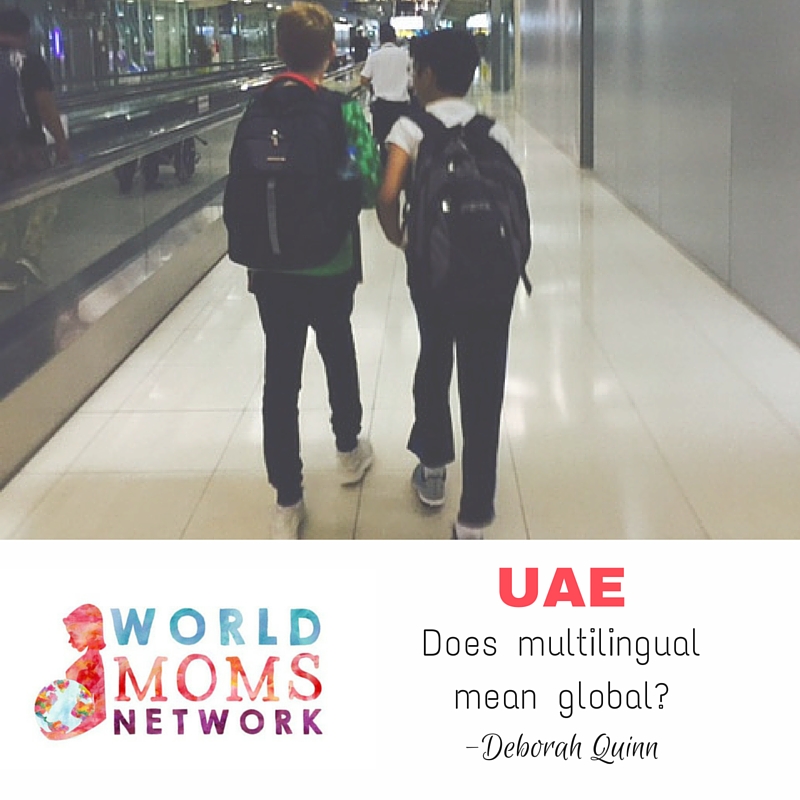
When we moved to Abu Dhabi from Manhattan five years ago, we intended to stay in “the Dhabs” for a year. Our kids had scored the Manhattan Grail: spots in a “gifted and talented” public school, which meant we wouldn’t have to sell everything we owned to pay for private school, and if we stayed away from the city for more than a year, we would lose the seats.
“But you have two spots at the school,” people said to me when I told them we were leaving. To ease their doubts, I kept talking about the benefits of an international education and experiencing different cultures–but to tell the truth, I think I was trying to convince myself. After all, if you’re a student in a Manhattan public school, you’re going to be connect with kids from around the world; it’s unavoidable. Did we really need to move halfway around the world to get a “global experience?” I wondered.
Three-quarters through our first year, we decided to take the leap and sign on for another year (or four) of expat life. A year just didn’t feel like enough time: we would have been packing up to move back just as we were starting to settle in. I felt as if all the energy (and exhaustion and not a few tears) that went into adjusting would have been wasted if we returned to New York after just a year.
The boys are studying Arabic in school, and in our travels through the region, they’ve picked a few phrases here and there — mostly “hello” and “thank you” and “chocolate” — in Sinhalese, Punjabi, Italian, Swahili, Korean. The trips we’ve been able to take from Abu Dhabi would have been impossible from Manhattan, especially on the salaries of two literature professors, and so in that regard, our expat life has delivered the sort of global awareness we were hoping for.
Or at least that’s what I think on my optimistic days. On other days, I wonder: does the simple fact of being able to say “hello” in eight different languages really make you globally aware? I suppose my wavering back and forth is just the expat version of questions most parents ask themselves–“is this school the right school,” “are we doing the best we can for our kids”–and we all have good days and bad days in terms of those answers. How do we raise global citizens? That question, in the light of “Brexit” and the demagoguery of Trump, seems increasingly important, even as the answers get more complicated.
I had to confront those questions just the other day in an emotional conversation with my younger son (now almost twelve). We were sitting on his bed in a hotel room in Bangkok, where we’d come for the Global Round of the World Scholar’s Cup, an academic competition that draws kids from, yes, around the world (but mostly Asia). I’d asked C. if he were nervous about the upcoming three days of competition in writing, debate, and current events quizzing, and his eyes welled up. He admitted that he wanted to do as well as his brother had, two years ago, in the same competition, but also, he said, “I don’t want you to feel like it was a waste for you to bring me here.”
Argh! A blow straight to the heart! How had he gotten the idea that my husband and I would resent the money we spent on airline tickets if he didn’t do well? Suddenly I was the one almost in tears.
I assured him that we didn’t think it was a waste at all and that we were ridiculously proud of him already, just for doing the work to get this far. “Being able to do things like this are why we moved to Abu Dhabi,” I said. “We couldn’t afford flying to Bangkok if we still lived in New York.” My son nodded, vaguely reassured (although still nervous and still in the grips of sibling rivalry).
Truth be told, he probably doesn’t believe me when I say that we’re proud of him already. In the mind of an almost twelve-year old boy, “winning” is pretty much the only thing that matters. Given that there are about 2,000 kids competing in his division, I’d say winning anything is a long shot. (Though if there were a category called “Minecraft knowledge,” he’d probably outscore the entire world.)
What I realized after our conversation, is that yes, this experience is part of why we moved to Abu Dhabi, even though at the time we’d never heard of the World Scholar’s Cup. Even with the international flavor of New York, this sort of intense week-long bonding experience with kids from around the world would not have been possible. This experience, of negotiating differences and finding connections across cultures, will go a long way (I hope) in establishing the foundations of a global citizenry.
C. will remember this week in Bangkok long after he’s forgotten how to say “hello” in Sinhalese. For this week, at least, I’m pretty sure that becoming an expat family was the right thing for us to do.
What about you? How do you raise your global citizens?
This is an original post to World Moms Blog by Deborah Quinn, Mannahattamamma of the UAE. Photo credit to the author.
After twenty-plus years in Manhattan, Deborah Quinn and her family moved to Abu Dhabi (in the United Arab Emirates), where she spends a great deal of time driving her sons back and forth to soccer practice. She writes about travel, politics, feminism, education, and the absurdities of living in a place where temperatures regularly go above 110F.
Deborah can also be found on her blog, Mannahattamamma.
More Posts
Follow Me:


by Tara Wambugu | Jun 24, 2016 | 2016, Gun Violence, North America, Tara Wambugu, The Americas, USA, World Motherhood
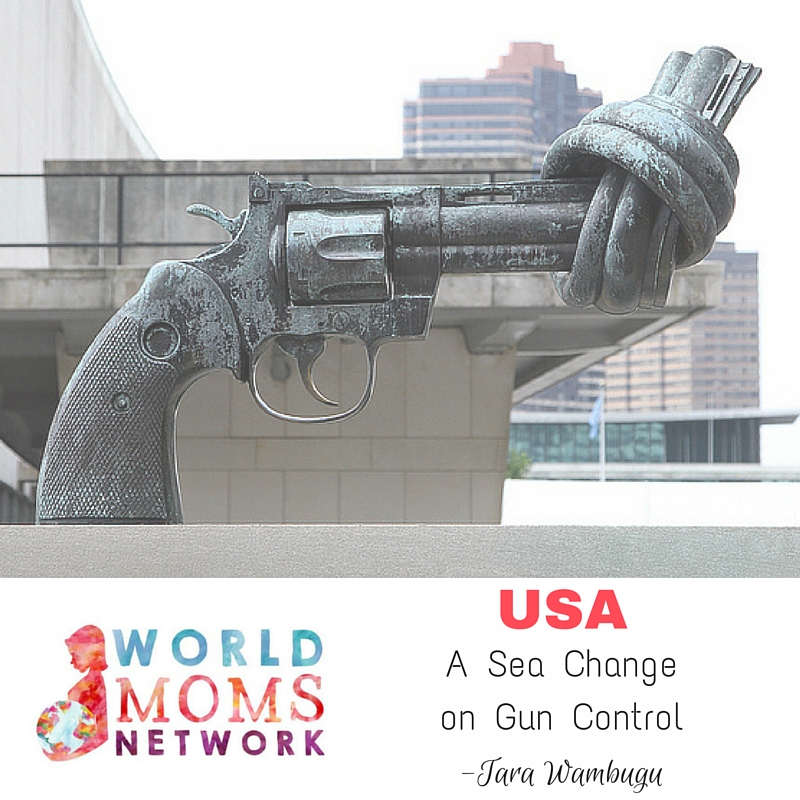
A thought-provoking tweet has been making the rounds on social media since the horrific mass shooting in Orlando. The tweet reads, “In retrospect, Sandy Hook marked the end of the US gun control debate. Once America decided killing children was bearable, it was over.” How can this be? How can this really be?
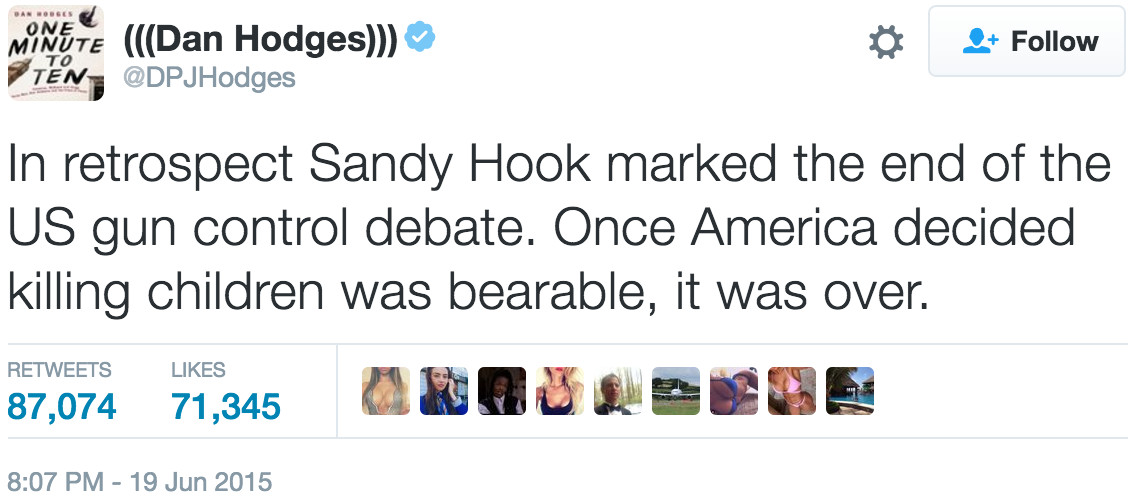
But something is happening. Since Orlando, there has been a swell of support for real change in gun control measures in the United States. Senator Chris Murphy held the floor for 15 hours in a filibuster to demand a vote on gun safety laws. Senators Dianne Feinstein and Chris Murphy brought two powerful amendments to the floor for a vote: one requiring background checks for all gun sales, and another blocking gun sales to suspects on the terrorist watch list (both, sadly, were voted down).

On Wednesday, Rep. John Lewis lead his colleagues in a sit-in on the House floor to demand a vote on common-sense gun control measures. Those representatives are held their ground for more than 24 hours, and plan to take up where they left off when Congress is back in session. In addition, City Council members in Charlottesville, VA passed a resolution this week asking the state to allow localities to create their own gun control laws. Since the Federal government hasn’t stepped up, the city of Charlottesville wants to take the safety of its citizens into its own hands.
Furthermore, scores of articles have appeared in the media championing everything from repealing the second amendment, to background checks for gun sales, from preventing dangerous people from purchasing guns, to banning assault weapons. And, perhaps most importantly, Americans are contacting their representatives in record numbers, insisting on gun control. Constituents across the United States tweeted, texted, called and wrote to their representatives demanding change.

Personally, I will no longer be a passive bystander. I will no longer do nothing shake my head every time there is a mass shooting, yet does nothing. I will stand up for my right and the rights of all to live a life free from the risk of being killed by a bullet. I will not rest until there is a sea change in the way we approach gun politics.
I stand with my fellow Americans, finally demanding an end to the unacceptable loss of life that has become completely routine in the United States. We will keep writing to our representatives until there is a real change in the way we approach gun control in America. We have lost thousands of innocent lives to gun violence. How many more deaths must we endure before we stand up and DEMAND gun control laws? We will endure no more. Enough is enough. We will NOT let Sandy Hook mark the end of the gun control debate in our country.
#ENOUGH #DisarmHate #NoBillNoBreak
This is an original post to World Moms Blog by Tara Wambugu.
Image credits: Knotted Gun via Jim, the Photographer / Flickr. Vigil for Orlando shooting via Fibonacci Blue / Flickr. Rally to prevent gun violence via Maryland GovPics / Flickr.
Tara Wambugu is a wife, a mother of two, and a Kenya-based lifestyle blogger covering parenting, family life, travel, and more. A former aid worker, Tara has worked in various countries in Europe, Central Asia, Africa, and Central America. She is now a stay-at-home mom living in Nairobi with her husband and their two sassy little girls. You can follow Tara and her family’s adventures on her blog, Mama Mgeni.
More Posts - Website
Follow Me:






by Adwoa Gyimah | Jun 23, 2016 | 2016, Africa, Africa and Middle East, Education, Ghana, Special Needs, World Motherhood
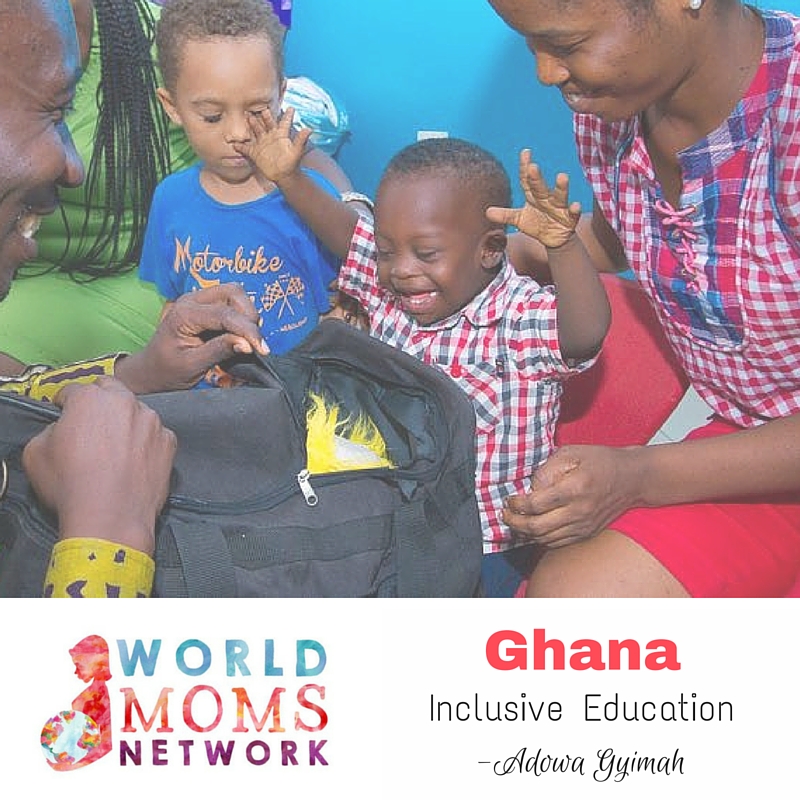
I am often asked why I decided to enrol my mainstream children in an inclusive school. I did a great deal of research when looking for the best school for my family, and I was encouraged by the testimonials of parents who had chosen this path for their mainstream children. I decided that an inclusive education was the best choice for my children.
Inclusion in education is an approach that seeks to embrace students of all abilities, including those with special educational needs. In inclusive schools, students with special needs learn side-by-side with their non-disabled peers. This educational approach avoids the use of separate schools or classrooms to separate students with disabilities from those without.
The inclusive school I chose for my children is the first of its kind in Ghana. Multikids Inclusive Academy is an inclusive international school educating children of all educational needs and abilities in a co-existing learning environment. In this school, children with special needs are not separated from the children without – they are integrated in the same class.
The school provides the best of both worlds to children with special of all abilities. They maintain small class sizes, making it possible for every child to get the assistance and attention they need. The school envisions a society where all people can live side by side respectfully and appreciate that we each have a unique contribution to make to the world. The academy seeks to build confidence and competency in all learners, and to promote excellence through an enabling environment. In this school, every child truly matters.
I am so happy that a school like this one exists in Accra, Ghana. My children will benefit from learning side-by-side with students of all abilities, and will learn that all children can reach their potential with the right support and encouragement.
Do you have inclusive schools where you live? Would you consider an inclusive education for your child?
This is an original post written by Adowa Gyimah of Ghana for World Moms Blog.
Photo courtesy of Multikids Inclusive Academy, Ghana.

by Purnima Ramakrishnan | Jun 17, 2016 | 2016, Adolescence, Boys, Europe, France, Girls, Happiness, Heartfulness, Humanity, Inspirational, International, Interviews, Meditation, Motherhood, Parenting, Partnerships, Purnima, Relationships, Sleep, Sleep and Children, Spirituality, Stress, The Alchemist, World Interviews, World Moms Blog, World Motherhood, Youth
“Please join us in the 2016 #Heartfulness Meditation Conference in the USA. If you are a World Moms Network contributor, or reader, or fan, please contact us (worldmomsblog@gmail.com) for a free pass.”
Our Senior Editor, Purnima Ramakrishnan in India recently interviewed Dr. Veronique Nicolai for World Moms Blog.
Part – 1 of Dr. Veronique Nicolai’s (Pediatrician and Trainer of Heartfulness Meditation) interview is published here. Part – 2 is published below.
Purnima Ramakrishnan: Are your children practicing Heartfulness meditation?
Dr. Veronique Nicolai: Yes. Our daughter started a little less than a year ago. She has seen us meditating since she was born. She said she was waiting for her to be old enough to start. We have always shared whatever we learned or discovered with Heartfulness with them. But I always told her that what I could share was nothing compared to what I am experiencing and she could know about meditation only when she was going to try it herself.
So, now that my daughter meditates, she comes out of her meditation with her eyes shining and says – “Wow!” I am happy that she started her own wonderful inner journey.
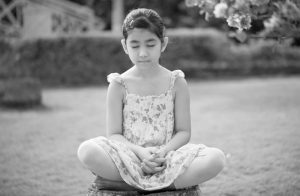
A child practicing Heartfulness Relaxation
PR: What are the health benefits you have observed in your child(ren) after they have started Heartfulness meditation?
VN: I have not only seen my daughter, but also other youth starting meditation early, and it has been amazing to see how strong it makes them. Children look incredibly happier; it shows on their face, they keep this brightness in their eyes. They are whole, authentic and balanced. And what is more important, this attitude is supported by the meditation practice, so it stays with them even when they fly out of the nest.
I used to worry about how my children were going to manage in the ‘outside world’ and I would have been easily over protective. But with them meditating and keeping their heart compass intact, I am very confident that they will help other youth find their balance too.
PR: What about the other holistic benefits for children to try Heartfulness Relaxation?
VN: I will give you a very practical example of how my son uses the Heartfulness relaxation. He is very sensitive and movies or stories can impress him. Sometimes he says he feels heavy and not able to fall asleep. So we do the relaxation together. I hold his feet in my hands and guide him into relaxation. And it helps like magic!
A child relaxing before going to sleep, relaxing before their exams or revisions, relaxing at these crucial times, helps him/her in the long run, in his life. It gives composure and they perform better. For some time, I did not even know they were doing it at school and enjoying it.
Such relaxed states of mind, helps us bring into this world, a balanced, content, happy breed of humanity who loves peace. We have a better generation ahead of us, which is not just holistic benefits for children, it is a holistic world, filled with compassion and peace.
PR: Please share a few things about Heartfulness Meditation which children and mothers should know for effective practising.
VN: To have balanced children, you have to have balanced parents. So the onus is first on us – parents. You can relaxation techniques for your younger kids whenever there is a stress, or to help in a difficult moment. But I would definitely recommend using it as a routine to go to sleep, everyday. It helps the child to enter sleep in relaxed manner and will ensure a quality sleep.
The hours of sleep before midnight are most important as deep sleep happens then. Deep sleep is crucial for growing children; it is then that the body heals, fights against infection and inflammation and when the growth hormone is produced.
We do not insist enough on the importance of a good night’s sleep in a growing child. It is even truer for teenagers!
The Heartfulness relaxation will teach in a natural way the child to listen to his heart, because the Heartfulness relaxation takes the child to the heart. And that is where the greatest values lie, and it will shape the child’s destiny.
Part – 1 of Dr. veronique Nicolai’s interview is published here.
World Moms Network has teamed up with the Heartfulness Institute as a media partner for their meditation conferences, the next one is at NJPAC. This interview post is part of the conference promotional, by Senior Editor, Purnima Ramakrishnan in India.
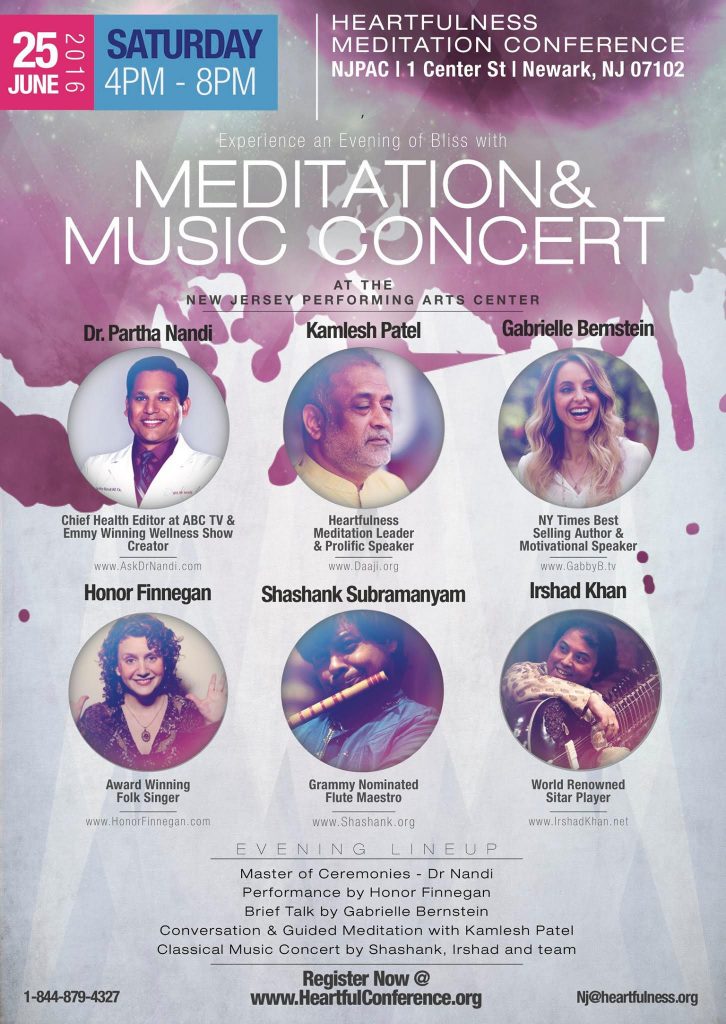
Welcome to the Meditation Conference at NJPAC
A limited number of free seats to the Heartfulness conferences are available to contributors and fans of World Moms Blog. You can register here!http://conference.heartfulnessinstitute.org/register
Please contact us (worldmomsblog@gmail.com) for a free pass.
Photo credit to the Heartfulness Institute.



 Many women nowadays have to split their time between a full time job and their kids (and their husband, and taking care of their home, and and and…). Another group of women is able to work from home, at least part of the time, or to work some at home and some in the office. If you, like me, are in this second group, some days it might seem like there are two women chatting in your head, the Professional working mom and the Homemaker. For me, a typical work day outside of the home goes more or less like this…
Many women nowadays have to split their time between a full time job and their kids (and their husband, and taking care of their home, and and and…). Another group of women is able to work from home, at least part of the time, or to work some at home and some in the office. If you, like me, are in this second group, some days it might seem like there are two women chatting in your head, the Professional working mom and the Homemaker. For me, a typical work day outside of the home goes more or less like this…


















